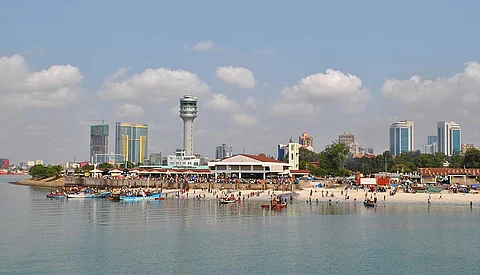
- Home
- About
- Globally Speaking
- Videos
- Podcast
- Geopolitics
- Industry
- SIGN UP

The land of Kilimanjaro and Serengeti offers investors a favourable climate, political stability and excellent links to potential export markets in Africa, the Gulf States and South Asia.
Nestled south of the equator, the United Republic of Tanzania was established in 1964 when the sovereign states of Zanzibar and Tanganyika united. Today Tanzania is ranks among the top 20 fastest-growing world economies and has been above the Sub-Saharan average of 5.2 per cent. Tanzania's strategic location that give sit access to trade links via the ocean means that 6 landlocked countries (Uganda, DRC, Rwanda, Burundi, Zambia and Malawi) rely on Tanzania for passage of goods. Over the last few years, the Tanzanian Government has implemented major economic reforms to liberalise trade and investment and enhance the role of the private sector.
Have you read
India is strengthening its bonds of friendship with the African continent
India can shine bright in the African continent
Uganda: The pearl of Africa offers investors several rich opportunities India's healthcare sector has much to offer Africa
India reaping the rewards of an age-old partnership with Africa
Sending COVID-19 medicines to Africa part of Modi's strategic outreach effort
Agriculture accounts for nearly half of national GDP contribution in Tanzania. Zanzibar, once a leading source of spices for the global market, continues to produce large amounts of cloves. Coffee is a major export crop, contributing nearly 17 per cent of the country′s foreign exchange. However, most Tanzanian farmers are small holder farmers that lack adequate access to technology and funds. The SAG-COT public-private partnership launched in 2010 provides investment opportunities for global and private investors through the creation of profitable clusters of farming with major benefits to smallholder farmers and local communities.
Tanzania's massive agricultural produced and abundant natural resources provide for plenty of raw materials for the manufacturing industries. Food processing offers a massive opportunity along with garment and textile industries and well as steel and ironworks. The EPZ and SEZ provide for a wide range of investment operations within the zones or within the standalone industrial park, investors in this category are provided with operators' license and start their business immediately without any need of having another license.
Tanzania has abundant reserves of several industrial minerals and precious metals and gemstones such as iron ore, soda ash, coal, clay soil, uranium, gold, diamond and tanzanite. Mining has placed Tanzania in the higher ranks of African economies in terms of attracting FDIs. The mining sector contributes approximately 3.0 per cent to annual GDP. Investment opportunities exist in the establishment of gold refineries, jewellery manufacturing and mineral processing.
Tanzania's tourism industry accounts for about 24.0 per cent of its exports and 17.2 per cent of GDP. More than 44 per cent of the country's land is covered in game reserves. Tanzania is home to over 16 national parks, including the world-famous Serengeti National Park, 40 conservation and marine parks and six world heritage sites. And, of course, there is the star attraction itself- Mount Kilimanjaro. This is a fast-growing sector offers plenty of investment opportunities in creating new accommodation, entertainment facilities, camping, lodges and guesthouses of international standards, which are much needed in Tanzania.
Read more:
Africa can be a test bed of Indian business commitment to profit and wider purpose
India sees big opportunities in Africa, a counterpoint to China
Africa needs targeted policies to bolster global trade
India-South Africa relations: In need of a booster dose
There are enormous opportunities in the services sector particularly ICT which is among the fastest-growing sub-sectors in Tanzania. There has been a rapid growth and transformation of the communications market in Tanzania in the last 10 years. The ICT market has grown in terms of subscribers, variety of services and the expansion of the coverage area. Huge opportunities lie in the telecom sector, in provision and operation of value added network/data services and digitalisation of financial services such as establishment of Financial Institutions, Microfinance banks; Investment Banks; Agricultural banks and Commercial banks.
India and Tanzania enjoy a vibrant business and commercial relationship. The country has been part of India's wider diplomatic and humanitarian outreach in Africa.
India is a leading trading partner of Tanzania comprising 15 per cent of Tanzania's foreign trade. India is also among the top five investment sources in Tanzania and as per Tanzania Investment Centre, Indian investments in Tanzania add up to USD 2.2 billion. According to the Ministry of External Affairs, India, the top five Indian imports from Tanzania are gold, cashew nuts, vegetables, oil and vegetable fats, and wood. The top five Indian exports to Tanzania are petroleum, medicaments, wires and cabled, optical fibre cables, and motorcycles.
Major Indian companies and brands are present or operating in Tanzania include Bank of Baroda, Bank of India, Canara Bank, Tata International Limited, Bharti Airtel, National Mineral Development Corporation, insurance companies (LIC, NIC, United India, etc), Kamal Group of Industries, Escorts, Ashok Leyland, Eicher, Bajaj, TVS, Kirloskar, Shapoorji Pallonji, Larsen & Toubro, Godrej.